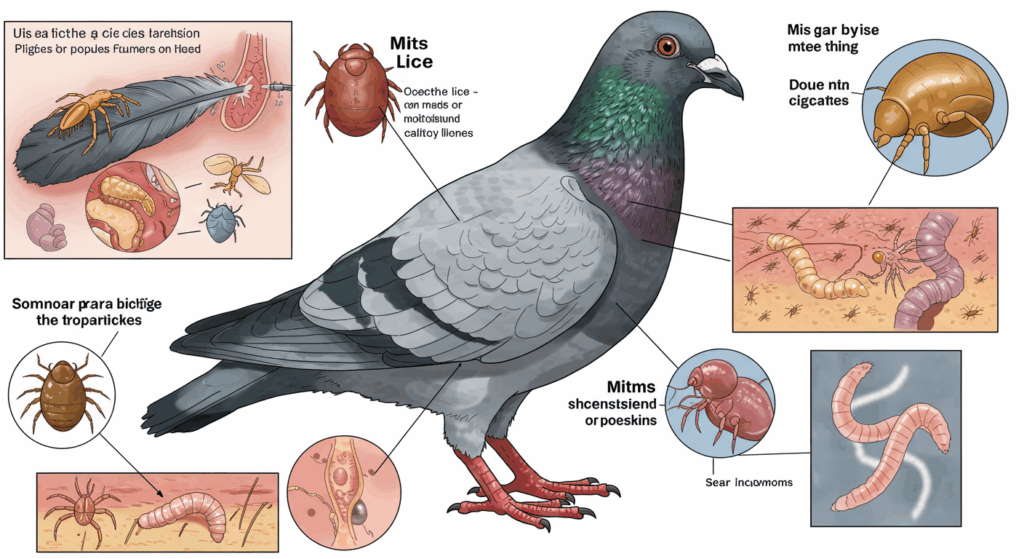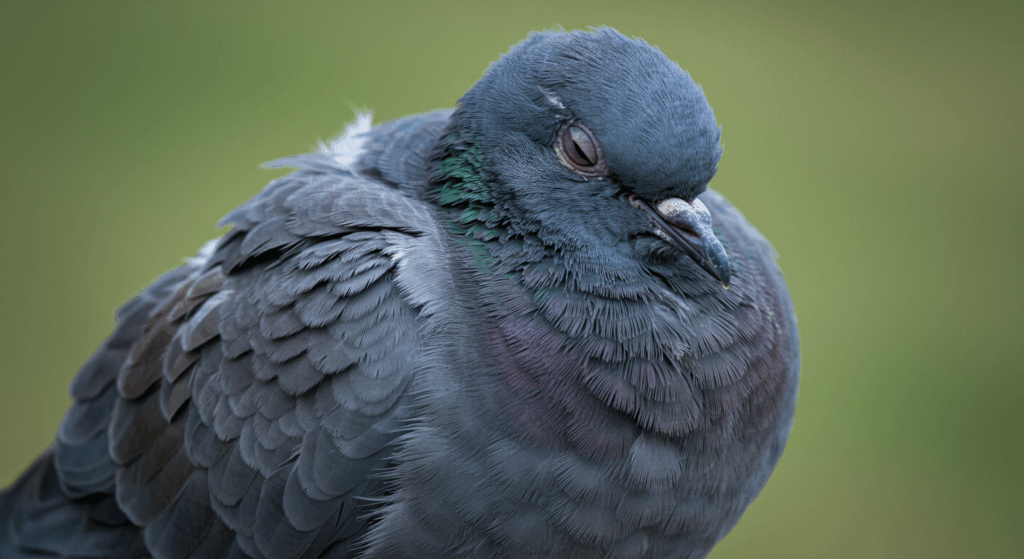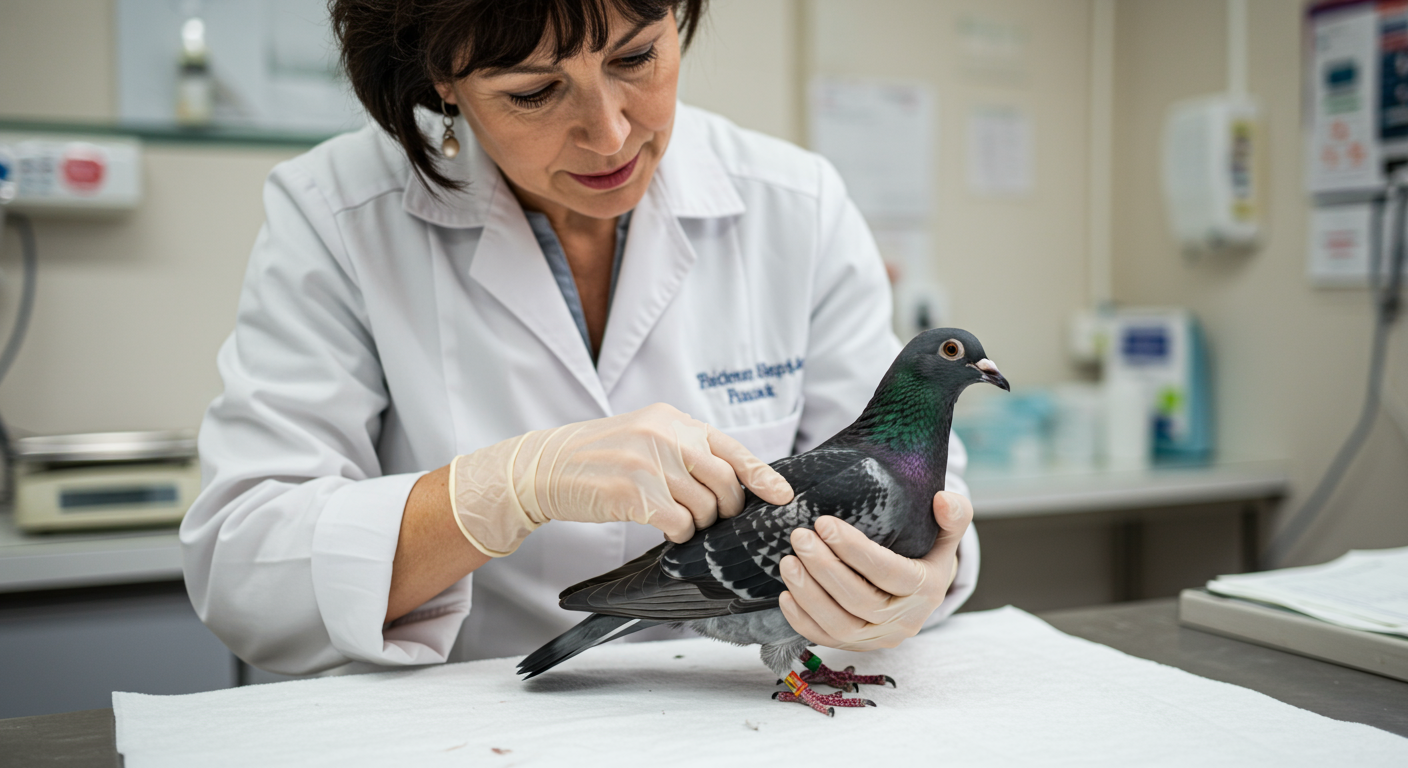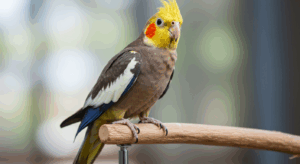Pigeons are more than city dwellers—they’re gentle, affectionate companions that many proudly keep as pets. But like all animals, pigeons can fall ill. As a responsible pigeon parent, it’s vital to understand the most common pigeon diseases, their symptoms, and how to treat or prevent them. Some conditions may cause simple discomfort, while others can lead to severe health issues or even death if not addressed early.
In this guide, we’ll walk you through the most common pigeon health problems, from parasites and infections to viruses and protozoal diseases.
Common Pigeon Diseases List
- Canker
- Lice
- Flies
- Coccidia
- Worms
- Hexamita
- Mites
- Chlamydia
- Respiratory Infections
- Mycoplasma
Pigeon Canker
Canker is one of the most common and contagious diseases in pigeons. It’s caused by a protozoan called Trichomonas gallinae. This disease spreads quickly through shared water bowls, parent-to-squab feeding, or close beak contact (billing).
Symptoms of Canker
- Breathing difficulty
- Visible nodules in throat or crop
- Lethargy
- Diarrhea
- Weight loss
- Bleeding from the mouth or cloaca
Canker mainly affects the digestive tract and nearby areas like the crop, throat, or cloaca. While it can look like other infections, a telltale sign is its location—it never appears on the wings or feet.
Treatment
Veterinarians usually prescribe anti-protozoal medications. In severe cases, surgical removal of nodules may be required.
Worm Infestations in Pigeons
Like many birds, pigeons can suffer from intestinal worms—commonly roundworms, tapeworms, or hairworms. These parasites rob your bird of nutrients and weaken their immune system.
Symptoms of Worms
- Diarrhea
- Weakness
- Weight loss
- Poor performance in flying or racing pigeons
Worm eggs or adult worms may sometimes be visible in droppings, but microscopic fecal exams provide a more accurate diagnosis.
Treatment
Your vet may prescribe deworming medications added to drinking water or administered directly.

Pigeon Coccidia
Coccidia is another protozoan parasite affecting a pigeon’s intestines. It’s often present in small, manageable amounts but can cause serious illness if it multiplies.
Symptoms of Coccidia
- Loose, watery droppings
- Lethargy
- Poor nutrient absorption
- Weight loss
Treatment
Routine fecal checks help detect early infections. Medication is only needed if symptoms are visible or levels are too high.
Pigeon Hexamita
Hexamita is a protozoal disease similar to canker. Though generally less dangerous, it can still disturb digestion and nutrient absorption.
Symptoms of Hexamita
- Vomiting
- Bloody or watery diarrhea
- Weight loss
Treatment
Hexamita is identified via microscopic fecal analysis. Medications are typically effective and prescribed by your vet.
External Parasites: Lice, Mites & Flies
External parasites like lice, mites, and flies are more than annoying—they can cause discomfort, skin damage, and disease transmission.
Symptoms
- Constant scratching or preening
- Feather holes
- Scaly skin on legs or face
- Restlessness
Treatment
Use vet-recommended medicated sprays or powders to treat and prevent infestations. Keep their cage clean and dry.
Respiratory Infections in Pigeons
These are among the most feared illnesses in pigeons, as they’re highly contagious and often life-threatening.

Symptoms
- Open-mouth breathing
- Nasal discharge
- Fluffed feathers
- Inactivity
- Sneezing or coughing
- Not eating
Respiratory infections can stem from bacteria, fungi, viruses, or parasites and affect the air sacs, lungs, or sinuses.
Treatment
Early vet intervention is crucial. Treatment may include antibiotics, anti-parasitics, and environmental cleaning.
Chlamydia (Psittacosis)
Chlamydia in pigeons is a viral infection that may stay dormant until a stressful event triggers a flare-up.
Symptoms
- Labored breathing
- Nasal discharge
- Lethargy
- Fluffed appearance
Treatment
Although it cannot be fully cured, symptoms can be managed with antiviral medication. Keeping the bird’s environment warm, dry, and stress-free is essential.
Mycoplasma Infections
Mycoplasma is another major cause of respiratory issues in pigeons. Like chlamydia, it’s often activated by stress or environmental changes.
Symptoms
- Sneezing
- Coughing
- Nasal discharge
- Eye swelling
- Difficulty flying
Treatment
Vets usually recommend antibiotics and supportive care. Prevent flare-ups by maintaining good hygiene and minimizing stress.
How to Keep Your Pigeon Healthy
Caring for a pigeon goes beyond feeding and housing—it requires attention to their hygiene, diet, and regular health checks. Here are some quick tips:
- 🧹 Keep lofts and cages clean and dry
- 💧 Change water daily to prevent disease spread
- 🐦 Avoid overcrowding to reduce stress
- 🧑⚕️ Schedule routine fecal and health exams with a vet
- 🦟 Use parasite control methods proactively
- 🍃 Minimize exposure to wild birds and insects
When to See a Vet
If your pigeon shows signs like trouble breathing, drooping wings, persistent diarrhea, or sudden weight loss, don’t wait. Contact an avian vet immediately. Quick action can save your bird’s life and prevent the spread of disease.
FAQs: Common Pigeon Health Questions
1. Can pigeons spread diseases to humans?
Some pigeon diseases, like chlamydia (psittacosis), can be transmitted to humans. Proper hygiene and handling are important.
2. How often should I deworm my pigeon?
Every 3–6 months or as advised by your vet based on fecal exams.
3. Can I treat pigeon lice at home?
Mild cases may respond to over-the-counter sprays, but vet-recommended treatments are safest.
4. Why is my pigeon breathing with its beak open?
This can signal respiratory distress—a possible infection. See a vet immediately.
5. Do pigeons need vaccines?
In some regions, vaccines for diseases like paramyxovirus are recommended. Check with your avian vet.
Bottom Line
Pigeons may seem hardy, but they’re vulnerable to several infectious and parasitic diseases. By staying informed, acting fast at the first sign of illness, and keeping a clean, low-stress environment, you can help your feathered companion live a long, happy, and healthy life.


